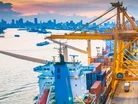DHL: UK SME Exporters Divided on Post-Brexit Outlook

Six months after the UK exiting the EU, research from DHL Express looks at the challenges small and medium-sized enterprises (SMEs) are facing across the UK, confirming that many are divided on the impact Brexit will have.
“Six months on from the UK’s departure from the European Union and it’s clear that the nation’s small businesses are still navigating the changes with mixed feelings. The findings from our exporter research reflect our own customers’ experiences, where some sectors have been able to stabilise and even grow, taking advantage of government incentives and new trade deals, while others are feeling a significant impact from the increase in regulatory complexity,” said Ian Wilson, Chief Executive at DHL Express UK&I.
Exporting Will Remain a Priority for 51% of SMEs
Of those who already export from the UK - or plan to do so in the future - agreed that exports would continue to be a priority for their business in the future (51%). 11% of those surveyed had either started exporting to new non-EU countries or were considering to in the near future.
However, 24% of those who already export or plan to in the future state that they have already stopped selling to some EU markets, while 6% have stopped altogether.
When asked if they would be exporting more or less in the next 12 months compared to the previous, there was a complete divide, 25% forecasted an increase, while 28% expected a decrease.
Export incentives and Concerns
Since January 1, 2021, the government has offered a number of export incentives, such as the SME Brexit Support Fund. While DHL Express’s research found that 30% believed these support measures to be helpful, 24% were unaware that they existed.
Lack of awareness also branches into concerns around additional customs charges, 43% believed this to be a challenge. However, despite this, only 28% are proactively alerting customers to the potential customs, VAT charges and shipping costs.
“It is encouraging that so many businesses continue to see a role for exporting in their future but it’s clear more needs to be done to manage the new trading environment we’re in. Whether it’s communicating clearly to consumers and suppliers, or refocussing on different markets, to thrive in a post-Brexit and post-Covid world, businesses must look at how to evolve their operations,” said Wilson.
“As we look to the future, we welcome more Free Trade Agreements to open up more markets and additional clarification from the Government on the regulatory requirements for businesses in every sector. SMEs are the engine of the British economy, but without the resources and infrastructure of larger businesses, it is essential that they’re provided with the right support. Streamlining [processes] will enable SMEs to take full advantage of any new trade deals and will provide a vital boost to our economy as we emerge from this challenging period,” said Wilson.
- Why Has The UK Dropped Out The Top 10 Manufacturing Nations?Production & Operations
- Accenture study reveals 'local' manufacturing trendProcurement & Supply Chain
- Electronics marketplace Back Market raises €450mnProcurement & Supply Chain
- The future for the manufacturing and supply chain industriesProcurement & Supply Chain

